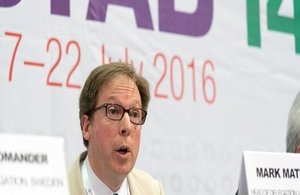UK Statement delivered to the UNCTAD XIV Ministerial meeting in Nairobi 20 July 2016
Delivered by HE Mark Matthews, Ambassador and Deputy Permanent Representative to the United Nations and other International Organisations in Geneva.

Ambassador Mark Matthews delivering the statement in Nairobi
Madam Chair, fellow delegates, ladies and gentlemen,
Let me begin by joining others in warmly thanking His Excellency President Uhuru Kenyatta, his Government and the people of Kenya for hosting this Conference. Let me thank them also for the very generous hospitality they have shown to UNCTAD officials and delegates over the last few days.
As His Excellency President Kenyatta said on Sunday at the opening of the Conference, we must look forward to build on the important trade and development gains made last year. Madam Chair, as always, our four-yearly Conference gives members the opportunity to help shape a future for UNCTAD that allows it as an organisation to champion the interests of trade and investment, particularly in promoting development in the poorest countries.
The UK greatly values UNCTAD’s role as a place to meet and discuss trade and development issues. We want to see an UNCTAD that works in the best interests of developing countries. And we want an UNCTAD that focuses on what it does best: producing objective and high-quality research and analysis, and using this to formulate clear policy advice, providing well-targeted assistance to deliver results on the ground. In these ways, UNCTAD can be an important implementing agency for the Sustainable Development Goals. UNCTAD can also help developing countries unlock the potential for them of the digital economy, through its ʺeTrade for Allʺ initiative, to which the UK has announced a financial contribution.
UNCTAD has made great strides in its ability to provide an effective service for its membership through the implementation of results-based approaches across the Secretariat’s work. But this work is not yet done, nor is it a process which can be finished. By continuing to demonstrate greater value for money, by keeping the cost of future work within existing resources, further integrating evidence- and results-based approaches to its work, and improving the independent evaluation capacity within the Secretariat, only then will UNCTAD be able to deliver effectively on its core mandate for the benefit of developing countries.
I would like to take this opportunity to place on the record the UK position on two issues which we expect to be raise in later statements.
The United Kingdom has no doubt about its sovereignty over the Falkland Islands and surrounding maritime areas, nor about the principle and the right of the Falkland Islanders to self determination as enshrined in the UN Charter and in article one of the two UN Covenants on human rights, by virtue of which they freely determine their political status and freely pursue their economic, social and cultural development.
This means there can be no dialogue about sovereignty unless the Falkland Islanders so wish. The 2013 referendum – in which 99.8% of those who voted wanted to maintain their current status as a territory of the United Kingdom – sent a clear message that the people of the Islands do not want dialogue on sovereignty. Argentina should respect those wishes.
The British Government also has no doubt about its sovereignty of the Chagos Archipelago which it administers as the British Indian Ocean Territory (BIOT). No international tribunal, including the Arbitral Tribunal constituted under Annex VII to the UN Convention on the Law of the Sea (UNCLOS), has ever called the UK’s sovereignty of the Territory into doubt.
Madam Chair, I would like to say a few words about the outcome of the referendum on the UK’s membership of the European Union. For the time being, the UK remains a full member of the European Union, with all the rights and obligations that go with that.
When we come out of the European Union, we will maintain our role as a global trading nation and open economy. We will work tirelessly to ensure that this unique opportunity will be used to shape a bright future for the UK. Over the coming months, our priorities are to: • Limit uncertainty in transition • To ensure our future relationship with the EU works for business • To keep Britain open to the world – the people of Britain have voted to leave the EU, but this does not mean turning our backs on Europe, international trade or development. I am proud that the UK meets its commitment to providing 0.7 percent of Gross National Income in Overseas Development Assistance and that our annual Aid for Trade expenditure exceeds £1 billion per year. This underlines our firm belief in the developmental benefits that trade can bring.
Finally, Madam Chair, now is the time for us to come together to work out how collectively we can implement the ambitious agenda set by the international community last year. UNCTAD has an important role to play, but it will only be able to do so if we focus on what the organisation can do, rather than reopening divisive and contentious debates of the past which help no-one, least of all those who need UNCTAD’s help the most.
Thank you.